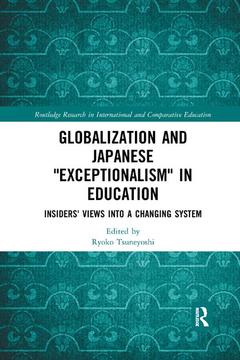Globalization and Japanese Exceptionalism in Education Insiders' Views into a Changing System Routledge Research in International and Comparative Education Series

Globalization is the most common overriding characteristic of our time, with societies all over the world struggling to change their educational systems to meet what are perceived to be the needs of globalization. This book provides an insider's account of how the Japanese educational system is trying to meet that challenge while placing the developments in a larger international context. Distinguishing itself from other books in the same genre, this volume (1) brings in the diversity of insiders? reactions concerning globalization reform in education, while placing such actions in the larger international context, and (2) covers a wide span of education (elementary to higher education) and shows how the globalization reforms as a whole are affecting Japanese education. With a focus on insiders? accounts, this book brings in information that is little known outside of Japan. It also links globalization processes in Japanese society, school education and higher education, accounting for similarities and differences across educational levels, providing insight into the multifaceted processes affecting the Japanese education system.
Chapters include:
- From High School Abroad to College in Japan: The Difficulties of the Japanese Returnee Experience
- The University of Tokyo PEAK Program: Venues into the Challenges Faced by Japanese Universities
- Why Does Cultural Diversity Matter? Korean Higher Education in Comparative Perspective
Acknowledgements
Notes on contributors
Part I. Setting the Stage
Chapter 1. Introduction
Chapter 2. "Exceptionalism" in Japanese education and its implications
Chapter 3. Japan’s challenge in fostering global human resources: policy debates and practices
Chapter 4. Global citizenship education in asia
Part II. Globalization and the multicultural challenge in Japan
Chapter 5. From high school abroad to college in Japan: The difficulties of the Japanese returnee experience
Chapter 6. Breaking in or dropping out?: filipina immigrant girls envisioning alternative lives in a globalized world
Chapter 7. Transition from university to work in Japan: Approaching expectations of international students
Part III. Case studies in meeting the global and multicultural challenge
Chapter 8. The University of Tokyo PEAK program : Venues into the challenges faced by Japanese universities
Chapter 9. Developing human resource for multicultural coexistence society: A case study of gunma university-gunma prefecture cooperation project “multicultural community advancement officers certificate program”
Part IV. The issues revisited
Chapter 10. Why does cultural diversity matter? Korean higher education in comparative perspective
Chapter 11. Globalization or anglicization?: A dilemma of English language teaching in Japan
Chapter 12. Japanese schooling and the global and multicultural challenge: Globalization from below
Index
Ryoko Tsuneyoshi is a professor of comparative education at the Graduate School of Education, The University of Tokyo. She is the present head of the secondary school attached to the Department of Education (2016-2017), and the former Director for the Center of Excellence in School Education (2013-2015). Ryoko Tsuneyoshi earned her Ph.D. at the Department of Sociology, Princeton University. She conducts cross-cultural comparisons of schooling through fieldwork, and she has also written extensively on multicultural issues. She was an executive board member of the Science Council of Japan, and is on the executive committee of the Intercultural Education Society of Japan and the Japan Educational Research Association.
Date de parution : 03-2019
15.6x23.4 cm
Disponible chez l'éditeur (délai d'approvisionnement : 14 jours).
Prix indicatif 53,83 €
Ajouter au panierDate de parution : 09-2017
15.6x23.4 cm
Thème de Globalization and Japanese Exceptionalism in Education :
Mots-clés :
Global Talent; Education; Multicultural Coexistence; Japanese; Japanese Universities; Globalization; Japanese Education; Exceptionalism; Full Time High Schools; Yuto Kitamura; Part-time High Schools; Akiyoshi Yonezawa; Gunma Prefecture; Yukiko Shimmi; Waseda University; Yoriko Ida; International Students; Tomoko Tokunaga; JASSO; Chun-Yi Tan; Higher Education World University Rankings; Yujin Yaguchi; Citizenship Education; Megumi Yuki; Times Higher Education World University; Gi-Wook Shin; World University Rankings; Rennie J; Moon; High Schools; Yoshifumi Saito; Task Based Language Teaching; Fumiko Takahashi; Multicultural Challenge; Hideki Ito; Job Hunting Activities; Lee Seulbi; Vice Versa; Maiko Sumino; Global Human Resources; Tate Kihara; Common Language; Satsuki Kubodera; Returnee Students; Hikaru Ishiwata; English Language Education; English Education Reform Plan; Job Hunting Process



